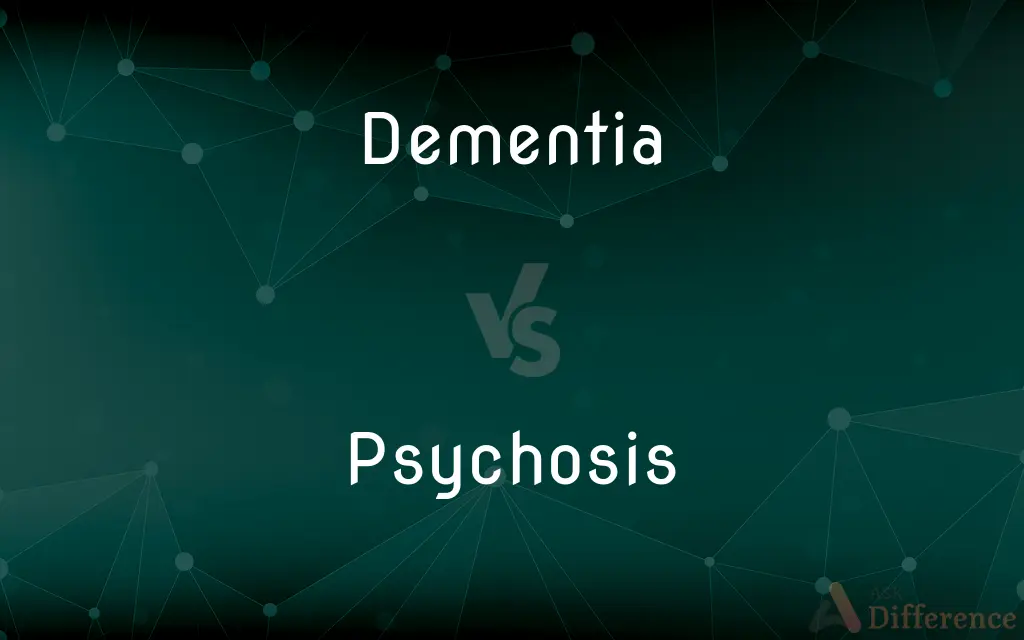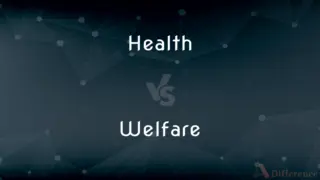Dementia vs. Psychosis — What's the Difference?
By Tayyaba Rehman & Maham Liaqat — Updated on May 5, 2024
Dementia primarily refers to a decline in cognitive function due to damage or disease in the brain, affecting memory and reasoning; psychosis is a symptom of various psychiatric illnesses characterized by delusions and hallucinations.

Difference Between Dementia and Psychosis
Table of Contents
ADVERTISEMENT
Key Differences
Dementia is a broad term for cognitive decline severe enough to interfere with daily life, commonly caused by Alzheimer's disease or other neurological conditions. Psychosis, on the other hand, involves symptoms like delusions and hallucinations, often seen in disorders such as schizophrenia.
While dementia progressively impairs cognitive skills, memory, and the ability to perform routine tasks, psychosis distorts a person's perception of reality, potentially leading to dangerous behaviors or profound confusion.
Dementia usually develops gradually and worsens over time, affecting mostly older adults. In contrast, psychosis can occur suddenly and at any age, depending on the underlying cause.
Treatments for dementia focus on managing symptoms and slowing progression through medications and lifestyle changes, whereas treatments for psychosis typically involve antipsychotic drugs and psychotherapy to control symptoms.
The impact on families and caregivers of individuals with dementia involves managing long-term decline and loss of autonomy; psychosis, however, often requires coping with unpredictable episodes and ensuring the safety of the individual and others.
ADVERTISEMENT
Comparison Chart
Definition
Decline in cognitive function due to brain damage.
Symptom of mental illness involving distorted reality.
Common Causes
Alzheimer's disease, stroke, brain injury.
Schizophrenia, bipolar disorder, severe depression.
Symptoms
Memory loss, confusion, difficulty speaking.
Delusions, hallucinations, disorganized thinking.
Age of Onset
Typically in older adults.
Can occur at any age.
Treatment Approach
Medications, caregiving, lifestyle changes.
Antipsychotic medications, therapy.
Compare with Definitions
Dementia
A chronic or persistent disorder of the mental processes caused by brain disease or injury.
My grandmother's dementia makes it difficult for her to remember recent events.
Psychosis
Can be part of schizophrenia, bipolar disorder, or severe depression.
Psychosis in bipolar disorder can manifest during extreme manic episodes.
Dementia
Characterized by memory disorders, personality changes, and impaired reasoning.
Dementia patients often require tailored daily living support.
Psychosis
Symptoms include hallucinations and delusions.
During a psychotic episode, she heard voices that no one else could hear.
Dementia
Impacts daily functioning and quality of life.
Dementia profoundly affects a person's ability to manage their daily routine.
Psychosis
A severe mental disorder in which thought and emotions are so impaired that contact is lost with external reality.
The young man experienced psychosis and believed he was a historical figure.
Dementia
Managed through medications and supportive care.
Medications can help manage some symptoms of dementia.
Psychosis
Treatable with medication and psychotherapy.
Antipsychotic medication helps to control his symptoms of psychosis.
Dementia
Progressive and typically irreversible.
Over years, dementia can progressively strip away one’s independence.
Psychosis
Requires careful diagnosis to determine underlying causes.
Her diagnosis of psychosis required several evaluations to understand its origin.
Dementia
Dementia manifests as a set of related symptoms, which usually surface when the brain is damaged by injury or disease. The symptoms involve progressive impairments to memory, thinking, and behavior, which negatively impact a person's ability to function and carry out everyday activities.
Psychosis
Psychosis is an abnormal condition of the mind that results in difficulties determining what is real and what is not real. Symptoms may include delusions and hallucinations.
Dementia
Loss of cognitive abilities, including memory, concentration, communication, planning, and abstract thinking, resulting from brain injury or from a disease such as Alzheimer's disease or Parkinson's disease. It is sometimes accompanied by emotional disturbance and personality changes.
Psychosis
A severe mental disorder in which thought and emotions are so impaired that contact is lost with external reality
The symptoms of psychosis
They were suffering from a psychosis
Dementia
(pathology) A progressive decline in cognitive function due to damage or disease in the brain beyond what might be expected from normal aging. Areas particularly affected include memory, attention, judgement, language and problem solving.
Psychosis
An acute or chronic mental state marked by loss of contact with reality, disorganized speech and behavior, and often hallucinations or delusions, seen in certain mental illnesses, such as schizophrenia, and other medical disorders.
Dementia
Madness or insanity.
Psychosis
(psychology) A severe mental disorder, sometimes with physical damage to the brain, marked by a deranged personality and a distorted view of reality.
Dementia
Insanity; madness; esp. that form which consists in weakness or total loss of thought and reason; mental imbecility; idiocy.
Psychosis
Any vital action or activity.
Dementia
Mental deterioration of organic or functional origin
Psychosis
A disease of the mind; especially, a functional mental disorder, that is, one unattended with evident organic changes.
Psychosis
Any severe mental disorder in which contact with reality is lost or highly distorted
Common Curiosities
What causes dementia?
Causes include Alzheimer’s disease, vascular dementia, Lewy body dementia, and frontotemporal dementia.
What are common symptoms of dementia?
Symptoms include memory loss, difficulty communicating, confusion, and changes in personality and behavior.
How does dementia progress?
Dementia typically progresses slowly over several years, but the rate can vary depending on the underlying cause and individual health factors.
How is psychosis diagnosed?
Diagnosis of psychosis involves psychiatric evaluations, medical history reviews, and sometimes brain imaging or other tests to rule out underlying conditions.
What is dementia?
Dementia is a general term for a decline in mental ability severe enough to interfere with daily life, primarily due to damage or disease in the brain.
Is dementia hereditary?
Some forms of dementia, like Alzheimer's disease, have a hereditary component, but having a family history does not guarantee one will develop dementia.
What lifestyle changes can help manage dementia?
Lifestyle changes that may help manage dementia include regular physical activity, a healthy diet, cognitive training, and social engagement.
What are the treatment options for psychosis?
Treatment typically involves antipsychotic medications, psychotherapy, and support for the individual and their family.
How is psychosis different from hallucinations?
Psychosis encompasses a range of symptoms including hallucinations (seeing or hearing things that aren't there) and delusions (false beliefs); it is broader than just hallucinations.
What triggers psychosis?
Triggers for psychosis can include stress, drug or alcohol abuse, lack of sleep, or other medical conditions.
Can children experience psychosis?
Yes, although rare, children and adolescents can experience psychosis, often linked to severe mental health conditions or as a result of trauma.
Can psychosis be temporary?
Yes, psychosis can be temporary, often triggered by extreme stress, substance use, or a particular medical condition and may resolve with treatment.
Is there a cure for dementia?
Currently, there is no cure for most types of dementia, but treatments are available that can help manage symptoms and improve quality of life.
Can psychosis lead to other mental health issues?
Psychosis can be part of other mental health conditions like schizophrenia or bipolar disorder, and it can exacerbate other mental health issues due to the stress it places on individuals and families.
What support is available for families of individuals with dementia?
Support for families includes educational resources, support groups, respite care services, and counseling to help cope with the challenges of caregiving.
Share Your Discovery

Previous Comparison
Bro vs. Brother
Next Comparison
Health vs. WelfareAuthor Spotlight
Written by
Tayyaba RehmanTayyaba Rehman is a distinguished writer, currently serving as a primary contributor to askdifference.com. As a researcher in semantics and etymology, Tayyaba's passion for the complexity of languages and their distinctions has found a perfect home on the platform. Tayyaba delves into the intricacies of language, distinguishing between commonly confused words and phrases, thereby providing clarity for readers worldwide.
Co-written by
Maham Liaqat















































